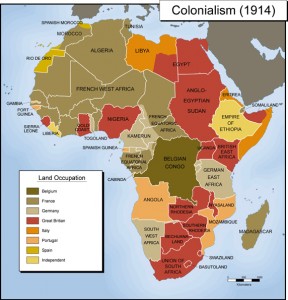Edward Morel was born in France in 1873, although he attended school in Britain and eventually became a naturalized British citizen in 1896. Throughout his life he held various jobs and was known as a British journalist, author, pacifist and politician. In 1899, Rudyard Kipling wrote “The White Man’s Burden” which celebrated colonialism and discussed the duty of the white man to civilize ‘savage’ populations. ((Rudyard Kipling, The White Man’s Burden, 1899)) Morel wrote The Black Man’s Burden in direct response to this work by Kipling. In The Black Man’s Burden, he discussed how colonialism decimated African populations through famine, forced labor and disease as well as by destroying social ties and breaking their spirits. ((Edward Morel, The Black Man’s Burden, 1903)) In this time period, there were few advocates for African rights but Morel developed an uncommon sympathy and respect for African cultures earlier in his life when working for a British shipping company. When looking at this company’s trade between Belgium and the Congo, Morel saw that no commercial goods were brought to the Congo, but valuable natural resources were brought back. Morel explored this relationship more, realizing that the resources were brought back at the expense of the native African people. He resigned his job at the shipping company and began to campaign against Congo misrule. He published his own magazine and started the Congo Reform Association to advocate for change in colonial practices in the Congo.
Morel was an unusual case for his time in Britain as many were supportive of imperialism and its ability to provide economic benefits to the controlling country. He spoke out against imperialism and brought many other prominent figures into the Congo Reform Association, eventually succeeding in changing the colonial rule there. Do you think that support from British citizens was necessary for change in colonial practices or would the suppressed peoples eventually have resisted and demanded this change for themselves? Did Morel go far enough in demanding better conditions for laborers or should he have advocated for no longer having colonies?


I had always heard of the book, The Black Man’s Burden but I never knew what is was about in context or the origins of how it came to be. I thought this post was very insightful because it allows you to understand the context in which the book was written. In a time when everyone was supporting imperialism, it was very brave of Edward Morel to speak out against it and share the other half of the story. It is people such as Morel who shape history and are the true hero’s of their time.
I do believe that British citizen support was needed in order for change to happen for the colonized nations; otherwise the government would have continued to exploit the colonized nations. I think that Morel was smart in advocating for better working conditions for laborers rather than abolishing colonies all together. One has to work in small steps, especially during a time where majority of the nation is in favor of the thing you are attempting to eliminate.